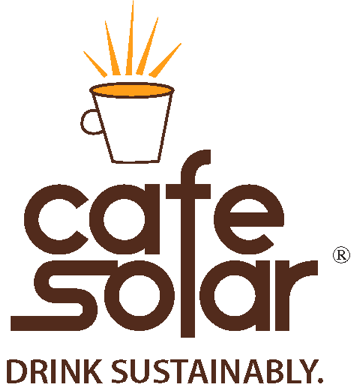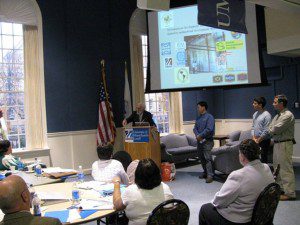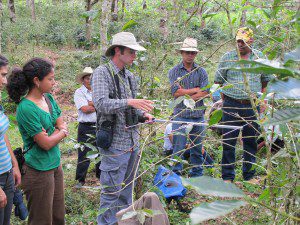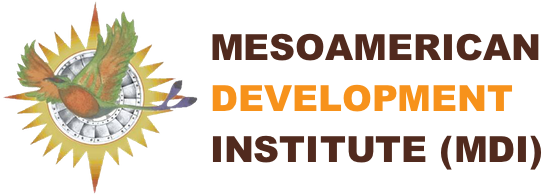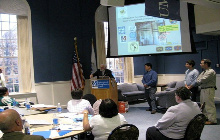
NERC/CIIRED
Mesoamerican Development Institute (MDI) has launched a collaborative research and experiential learning program in partnership with the University of Massachusetts through UMass Lowell’s Initiative for Sustainable Infrastructure (ISI). The program is being conducted within the Networked-Engineering Research Center (NERC)—in Spanish, Centro de Investigación de Ingeniería en Red (CIIRED), a consortium of universities. Members of the consortium will be providing technical support and training for MDI’s practitioner partners—the cooperatives that are adopting clean technology and clean production methods for this project. Through a Teaming Agreement with the University of Massachusetts, MDI has now formalized the program with the Universidad Nacional Autónoma de Honduras (UNAH) and the practitioners that are adopting renewable energy technology and biodiversity-friendly agroforestry systems for the production of coffee and biofuels.
The CIIRED is building on MDI’s award-winning research to date and is engaging students and faculty with the cooperatives who are implementing sustainable supply chain innovations for these sectors. The CIIRED will provide long-term training, education, and targeted onsite technical support for knowledge-driven transformation to sustainable supply chains.
The project-based CIIRED initiatives are designed to assist cooperatives adopting the renewable energy technology and IOC production so that they may become more successful and flourish. In addition, the technology transfer experience and its learning requirements are documented and educational materials developed to support local universities and cooperatives in the knowledge-based transition to sustainable supply chains.
The pioneering cooperatives are serving as classrooms for the presentation and development of new courses and curricula for sustainability in coffee and biofuel production and processing at UNAH and for the accredited program it has with the Honduran Coffee Institute (IHCAFE).
Within this initial proposal, the following collaborative educational program components would be implemented:
- UNAH certificate programs aimed at students and adults in biodiversity-friendly agroforestry system (for coffee, biofuels and essential oils), fundamentals of carbon trading and verification, and operation of off-grid processing centers (renewable energy technology).
- Certification for a attainment of a level of proficiency in the protocols for Integrated Open CanopyTM (IOC) production and Mixed Productive Canopy [which support native biodiversity, can increase connectivity among forest fragments, and can buffer remaining forest from harmful edge effects]. The ability to use GPS and mapping software to map farms and measure areas of land use will be an important skill.
- Certification of having obtained proficiency in the operation and maintenance of off-grid processing equipment using biofuels, biomass, and solar energy. [This will be available to both youths and adults working in the coffee sector, specifically the practitioner cooperatives adopting the technology.] It will cover fundamentals of energy flows in coffee processing, sources of inefficiencies, fundamentals of drying, fundamentals of solid fuel combustion, thermal losses, fundamentals of heat and mass transfer, and fundamentals of energy, electricity load management, economics and costing. Hands-on training with hybrid processing technology will be a component by which students and practitioners will gain proficiency and experience.
- Certification for attaining mastery of fundamental concepts and procedures for carbon project validation and verification will be another important skill for today’s university students. [This will include how to estimate carbon in IOC production and fuel switching technology as well market requirements for project preparation. It will focus on the fundamental concepts and procedures for carbon project verification and certification for UNAH faculty and students as future partners in the NERC/CIIRED accredited validation and certification unit. The carbon trading focus will therefore help to train the future group of professionals that will be expanding the carbon markets in the Central American region.]
- Accreditation of carbon unit within NERC/CIIRED providing validation and certification for carbon trading projects.
Knowledge and expertise in this area is increasingly in demand as international consensus is spawning a new industry through such protocols as the United Nations Collaborative Initiative on Reduced Emissions from Deforestation and Degradation (REDD and REDD+); Afforestation; Reforestation, and Revegetation (ARR); and Agriculture Land Management (ALM). These recent protocols for carbon trading are particularly suited to the ground-breaking research being undertaken by MDI and UMass student/faculty field research teams because IOC production methods have the potential to transform major agricultural landscapes in coffee growing regions. The operation of the carbon unit will greatly enhance CIIRED/NERC collaborative research and education objectives among its partners, which have unique and specialized knowledge and experience, as well as access to practitioners in the field that are adopting innovations in processing and production for coffee, biofuels and essential oils.
Accreditation of the carbon unit for such standards as the Voluntary Carbon Standard (VCS) sectoral scopes could be done through the Clean Development Mechanism Accreditation Panel or the American National Standard Institute (ANSI).
A high degree of collaborative, multidisciplinary, international, education and training serving the practitioners adopting clean technology and production methods with documentation of technology transfer experiences for use in the classes and development of educational materials.
The NERC/CIIRED Universities include the following institutions:
- University of Massachusetts Lowell (Led by MDI in coordination with ISI)
- University of Massachusetts Amherst
- Universidad Nacionál Autónoma de Honduras
- Universidad Regional Autónoma de la Costa del Caribe de Nicaragua
- Universidad Nacionál de Costa Rica
The Honduran practitioner organizations which are the focus of the NERC/CIIRED for this program effort include the following:
- Cooperative COMISUYL, Subirana, Yoro, Honduras: A coffee cooperative installing the world’s first processing center powered entirely with renewable energy technology. The cooperative features industrial drying technology and other components manufactured in Massachusetts and throughout New England. In addition, an alliance of coffee companies including, locally, Red Barn Coffee Roasters in Massachusetts, will market the organic and Fair Trade coffee dried using the renewable energy technology to cafes, universities, colleges, and supermarkets.
- Biocombustibles de Yoro, SA: This company in Yoro, Honduras, is developing biofuels produced by small farmers and receiving technical support through CIIRED/NERC in the area of quality control, efficiency and environmentally-friendly production methods that will enable it to provide biofuel for electricity production at the processing center in Surbirana.
Resumen del Centro de Investigación de Ingenieria en Red? CIIRED (Networked Engineering Research Center?NERC)
El Mesoamerican Development Institute (MDI) se ha asociado con la Universidad de Massachusetts Lowell para crear un programa colaborativo de investigación y educación multidiciplinariocon participación inicial de los campus de Lowell y Amherst y tres universidades en Centro America. Son miembros también los denominados practicantes: organizaciones cooperativas participantes que están adoptando la tecnología y participando en la educación experiencial desarrollada orientada a la adopción de energía renovable, implementación de procesos agro-foresales productivos de alta biodiversidad en los sectores de café, biocombustibles y aceites esenciales. El sector café es muy relevante dado que un segmento de la población rural muy grande participa de su producción, utiliza aproximadamente el 38% de tierra cultivada en Mesoamerica y es una actividad económica de carácter mundial.
Universidades CIIRED/NERC:
- Universidad de Massachusetts Lowell (con participación del MDI con oficina en campus)
- Universidad de Massachusetts Amherst
- Universidad Nacionál Autónoma de Honduras
- Universidad Regional Autónoma de la Costa del Caribe de Nicaragua
- Universidad Nacionál de Costa Rica
Cooperativas Practicantes participando:
- Cooperativa COMISUYL, Subirana, Yoro, Honduras: Es una cooperativa asociada al Mercado Justo que se convertira en la primera organización rural que adopta energía renovable en la operación de beneficiado de café. La Cooperativa utilizara equipo de punta fabricado en Massachusetts. Un grupo de compañías asociadas en la venta de café trabajaran en USA, Toronto, Canada y Gotemburgo, Suecia a crear nuevos mercados. El café será vendido en las cafeterías de la Universidad de Massachusetts iniciando en el campus de Lowell y en supermercados.
- Biocombustibles de Yoro, SA: Es una organización de pequeños productores con base en la Ciudad de Yoro, que recibirán asistencia directa de CIIRED/NERC en producción, control de calidad, eficiencia y plantaciones de alta biodiversidad. Supliran de un biocombustible liquido a el Beneficio de Café para la generación de electricidad.
- Cooperativa Montes de Oro, Miramar, Costa Rica: Es una cooperativa asociada al Mercado Justo y el consortio, COOCAFE. Montes de Oro Montes ha proporcionado a los sitios de estudio para la producción del IOC durante los últimos siete años. Se trata de la primera cooperativa de usar el secado solar/biocombustible.
Try The Sustainable Coffee Created From The Mesoamerican Development Institute Research
- It is the first coffee to be processed using 100 per cent clean, renewable energy from solar panels.
- protects tropical forests and creates rich, biodiverse growing conditions around coffee farms.
- Certified Organic Coffee, Cafe Solar® makes use of a special organic fertilizer derived from coffee pulp.
Donate To the Research!
Your Funding Helps with:
- Increasing sustainability in the coffee industry using innovative clean energy technology and forest-friendly farming methods.
- Helping independent farmer organizations by providing economic security, valuable training and better job opportunities.
- Supporting women in important management positions in Central America.
